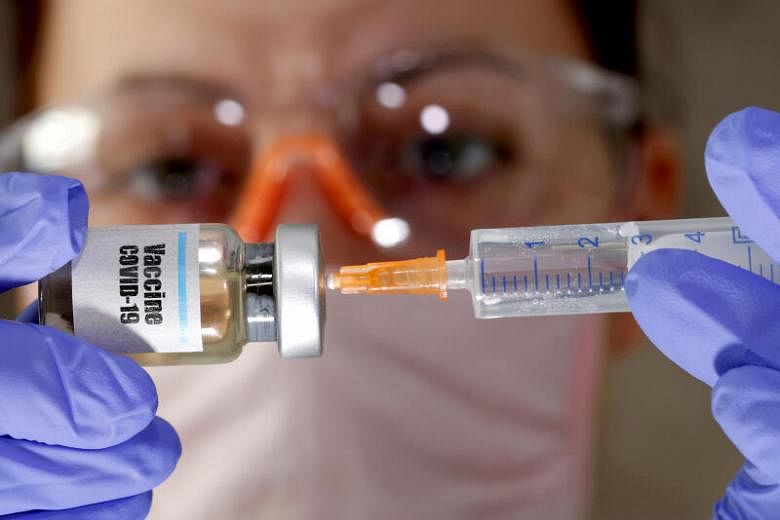Almost 200 Covid-19 vaccine candidates are being studied by scientists around the world.
Of these, 44 are already in clinical trials, which means they are being tested on humans.
Here are some prominent candidates in the Covid-19 vaccine race.
1 Duke-NUS and Arcturus Therapeutics: Lunar-Cov19
This vaccine was developed by Singapore researchers at Duke-NUS Medical School and American pharmaceutical company Arcturus Therapeutics.
Professor Ooi Eng Eong from Duke-NUS said results so far show that the potential vaccine could be effective as a single dose, which differentiates it from many other Covid-19 vaccines in development.
Preliminary findings also indicate positive responses in both safety and human immune response.
Later-stage clinical trials, which usually involve thousands to tens of thousands of people across multiple jurisdictions or countries, could start before the end of this year.
2 Pfizer and BioNTech: BNT162b2
Data from an ongoing large-scale human trial has shown that this experimental vaccine developed by the two firms is 90 per cent effective in preventing Covid-19. It uses synthetic mRNA to activate the immune system against the virus.
The potential vaccine is awaiting data on safety, which could come later this month.
But it needs to be kept at minus 70 deg C or below, which is a logistical obstacle as most hospitals do not have such storage facilities.
The vaccine can be kept in an ultra-low temperature freezer for up to six months, or for five days at between 2 deg C and 8 deg C - a type of refrigeration commonly available at hospitals.
3 Moderna Therapeutics: mRNA-1273
A potential vaccine by the Massachusetts-based drug company, in collaboration with the United States National Institutes of Health, has also reached human trials, having enrolled 30,000 people at 89 sites across 30 US states and the District of Columbia.
The company is still monitoring the results of its phase two trials, which involve testing the vaccine on those with the disease.
Moderna had said in May that it was on track to deliver at least 500 million doses of the vaccine each year beginning next year, in collaboration with Swiss manufacturer Lonza.
However, in an interview with The New York Times in September, the firm said the vaccine is unlikely to be publicly available in the first half of next year.
4 Gamaleya Research Institute of Epidemiology and Microbiology: Sputnik V
The Russian Health Ministry said on Monday that the vaccine is more than 90 per cent effective, citing data collated from vaccinations of the public rather than from an ongoing trial.
Russia is rolling out the vaccine for domestic use despite the fact that late-stage trials have not yet been completed.
It is preparing to publish preliminary results of an ongoing large-scale human trial involving 40,000 people in Moscow this month.
5 AstraZeneca: ChAdOx1 nCoV-19
Britain's AstraZeneca and the University of Oxford have taken their potential vaccine to the final stage of clinical trials in other countries, and are currently looking for up to 50,000 volunteers in total from Brazil, the United Kingdom, the US and South Africa.
Preliminary results from the first two clinical trial phases showed that the vaccine triggered a strong immune response - including increased antibodies and responses from T-cells - with only minor side effects such as fatigue and headaches.
However, trials were paused for a month due to a safety review on Sept 8, as a patient had developed an unexplained adverse reaction. Trials restarted in the US a month later and are ongoing.
6 Sinovac Biotech: CoronaVac
Chinese firm Sinovac Biotech's vaccine CoronaVac, which uses a chemically inactivated version of the virus to trigger an immune response, has been undergoing the final stage of clinical trials in Brazil, Indonesia and Turkey.
But the trial in Brazil of 9,000 people was recently stopped by the country's health regulator, which cited an "adverse incident" involving a volunteer recipient last month. The announcement came a day after a vaccine by Pfizer and BioNTech was reported to be more than 90 per cent effective.
Such pauses give regulators a chance to analyse risks that emerge during the course of the study and are not uncommon in large-scale drug trials, but China has already started administering its vaccines under an expansive emergency use approval.
Meanwhile, Sinovac said it is confident about the safety of its vaccine.


